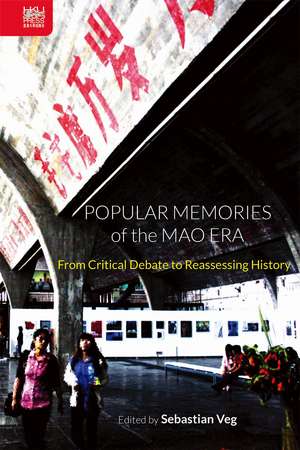Popular Memories of the Mao Era: From Critical Debate to Reassessing History
Editat de Sebastian Vegen Limba Engleză Hardback – 14 apr 2019
The present volume provides an overview of new forms of popular memory, in particular critical memory, of the Mao era. Focusing on the processes of private production, public dissemination, and social sanctioning of narratives of the past in contemporary China, it examines the relation between popular memories and their social construction as historical knowledge. The three parts of the book are devoted to the shifting boundary between private and public in the press and media, the reconfiguration of elite and popular discourses in cultural productions (film, visual art, and literature), and the emergence of new discourses of knowledge through innovative readings of unofficial sources. Popular memories pose a challenge to the existing historiography of the first thirty years of the People’s Republic China. Despite the recent backlash, these more critical reflections are beginning to transform the mainstream narrative of the Mao era in China. Public discussions of key episodes in the history of the People’s Republic, in particular the Anti-Rightist Movement of 1957, the Great Famine of 1959–1961, and the Cultural Revolution, have proliferated in the last fifteen years. These discussions are qualitatively different from previous expressions of traumatic or nostalgic memories of Mao in the 1980s and the 1990s respectively. They reflect a growing dissatisfaction with the authoritarian control over history exercised by the Chinese state, and often they make use of the new spaces provided for counter-hegemonic narratives by social media and the growing private economy in the 2000s. Unofficial or independent journals, self-published books, social media groups, independent documentary films, private museums, oral history projects, and archival research by amateur historians, all of which analyzed in this collection, have contributed to these embryonic public or semi-public dialogues.
Preț: 334.54 lei
Nou
Puncte Express: 502
Preț estimativ în valută:
64.01€ • 69.75$ • 53.94£
64.01€ • 69.75$ • 53.94£
Cartea se retipărește
Doresc să fiu notificat când acest titlu va fi disponibil:
Se trimite...
Preluare comenzi: 021 569.72.76
Specificații
ISBN-13: 9789888390762
ISBN-10: 9888390767
Pagini: 256
Ilustrații: 15 b&w and 9 color illus.
Dimensiuni: 152 x 229 x 20 mm
Greutate: 0.52 kg
Editura: Hong Kong University Press
Colecția Hong Kong University Press
ISBN-10: 9888390767
Pagini: 256
Ilustrații: 15 b&w and 9 color illus.
Dimensiuni: 152 x 229 x 20 mm
Greutate: 0.52 kg
Editura: Hong Kong University Press
Colecția Hong Kong University Press
Recenzii
“An excellent guide to the independent journalism, cultural production, and amateur histories that are transforming the mainstream narrative of the Mao era in China. Rich in detail and sound in analysis, these studies document the emergence of critical memory in Chinese society. A valuable resource for students and scholars.” —Timothy Cheek, University of British Columbia; author of The Intellectual in Modern Chinese History
“Popular memories of the Mao era are signposts of contemporary politics and culture. This volume features exciting new research by distinguished scholars. Extremely rich and readable, the chapters in this collection illuminate both China’s past and present. A timely and important contribution.” —Guobin Yang, University of Pennsylvania; author of The Red Guard Generation and Political Activism in China
Notă biografică
Sebastian Veg is professor of intellectual history and literature of twentieth-century China at EHESS, Paris and honorary professor at the University of Hong Kong.
Textul de pe ultima copertă
History / China
Descriere
The present volume provides an overview of new forms of popular memory, in particular critical memory, of the Mao era. Focusing on the processes of private production, public dissemination, and social sanctioning of narratives of the past in contemporary China, it examines the relation between popular memories and their social construction as historical knowledge. The three parts of the book are devoted to the shifting boundary between private and public in the press and media, the reconfiguration of elite and popular discourses in cultural productions (film, visual art, and literature), and the emergence of new discourses of knowledge through innovative readings of unofficial sources. Popular memories pose a challenge to the existing historiography of the first thirty years of the People’s Republic China. Despite the recent backlash, these more critical reflections are beginning to transform the mainstream narrative of the Mao era in China. Public discussions of key episodes in the history of the People’s Republic, in particular the Anti-Rightist Movement of 1957, the Great Famine of 1959–1961, and the Cultural Revolution, have proliferated in the last fifteen years. These discussions are qualitatively different from previous expressions of traumatic or nostalgic memories of Mao in the 1980s and the 1990s respectively. They reflect a growing dissatisfaction with the authoritarian control over history exercised by the Chinese state, and often they make use of the new spaces provided for counter-hegemonic narratives by social media and the growing private economy in the 2000s. Unofficial or independent journals, self-published books, social media groups, independent documentary films, private museums, oral history projects, and archival research by amateur historians, all of which analyzed in this collection, have contributed to these embryonic public or semi-public dialogues.
